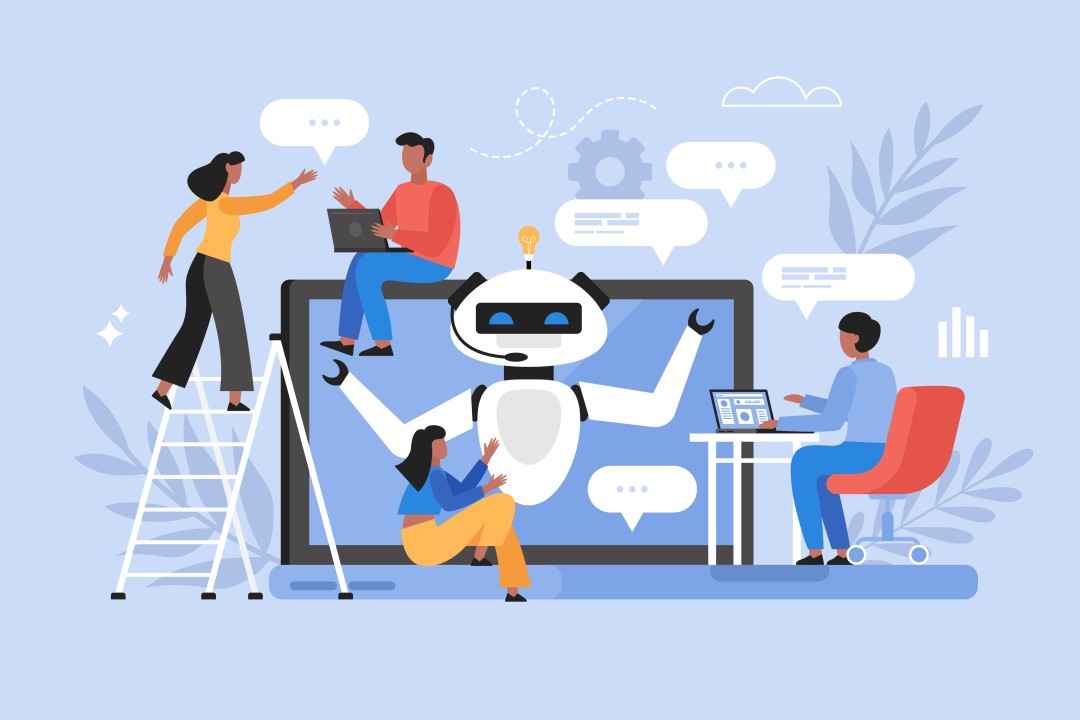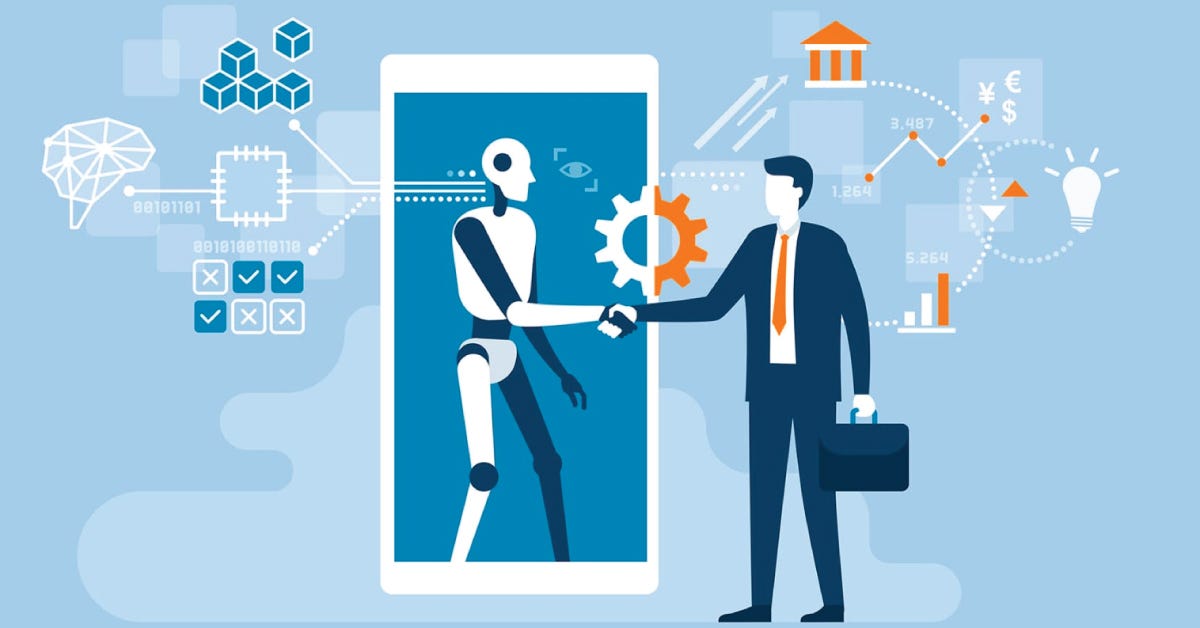Artificial Intelligence (AI) is revolutionizing the way businesses interact with their customers, offering highly personalized experiences that drive consumer engagement and loyalty to new heights. According to Salesforce’s 'State of the Connected Customer' report, a staggering 76% of customers now expect companies to understand their needs and expectations, underscoring the critical role of AI in creating tailored experiences. By leveraging AI, businesses are not only meeting but exceeding these expectations, marking a paradigm shift in customer-centric marketing strategies.
Imagine a shopping experience where every product recommendation feels like it was handpicked just for you, or a customer support chat that solves your problem in an instant. This isn't the distant future; it's the reality of today's AI-powered customer experience. Embrace the AI revolution and be a part of a world where businesses truly understand your unique needs and preferences.

Introduction to AI in Customer Experience
Artificial Intelligence (AI) is not just a futuristic concept anymore; it's a key player in transforming customer experience today. Let's delve deeper into how AI is ushering in a new era of personalized, efficient, and extraordinary customer experiences.
Evolution of Customer Service with AI
One of the key areas where AI has brought about a sea change is customer service. From chatbots to automated email responses, AI is helping businesses provide round-the-clock assistance, significantly reducing wait times and improving customer satisfaction.
AI Chatbots
AI chatbots are at the forefront of this revolution, offering real-time engagement and instant problem-solving capabilities. These AI-powered chatbots have evolved from simple scripted responses to understanding complex queries thanks to Natural Language Processing (NLP). For instance, Sephora's AI chatbot "Kik" offers personalized makeup advice and product recommendations based on user conversations.
Automated Email Responses
Another game-changing AI application is automated email responses. Instead of generic responses, AI can analyze customer emails and craft personalized replies, dramatically improving response times and efficiency. Companies like Google use AI to suggest quick responses in their email service, Gmail, which accurately captures the context of the conversation.
Sentiment Analysis
AI also empowers businesses to interpret customer sentiment and feedback on different platforms (social media, customer reviews, etc.). This invaluable insight allows businesses to proactively address customer pain points and continually improve their products and services.
Through these examples, it's evident that AI is reshaping customer service by enabling instant, personalized, and efficient interactions. Businesses that adopt AI in their customer service strategy are set to gain a distinct advantage in the competitive market.
Key Benefits of AI-Driven Personalization
AI-driven personalization has some key advantages over regular copywriting, including improved customer segmentation, enhanced upselling and cross-selling opportunities, heightened consumer engagement, and superior customer loyalty.
This holistic view will further illuminate the positive impact of AI on businesses and the experiences they provide to their customers. Here is just a start of the biggest benefits your business could see:
- Improved Customer Engagement: AI-driven personalization allows for highly targeted interactions that resonate with customers on a deeper level. For example, Netflix's personalized movie recommendations keep users engaged and influence their next watch decision.
- Increased Conversion Rates: By providing customers with personalized product or service recommendations, companies can significantly boost their conversion rates. For instance, Amazon's recommendation engine, driven by AI, often leads to customers making additional purchases.
- Enhanced Customer Retention: When customers feel heard and understood, they are more likely to stay loyal. Spotify's personalized playlists, 'Discover Weekly' and 'Daily Mix', have been effective retention tools, keeping users coming back for more.
- Effective Marketing Campaigns: AI personalization enables businesses to tailor their marketing efforts based on individual customer preferences and behaviors, leading to more successful campaigns. For example, Coca-Cola's 'Share a Coke' campaign, which personalized bottles with names, led to a significant increase in sales.
- Superior Customer Experience: AI-driven personalization ensures that customers receive relevant and timely support. For instance, AI-powered chatbots, like those used by Zappos, can provide personalized customer service based on previous interactions.
- Operational Efficiency: AI can automate and personalize routine tasks, increasing operational efficiency. For example, Google's AI-powered email assistant can suggest quick, contextually relevant replies to emails.
- Real-time Personalization: AI can analyze real-time data to provide instant personalization. For instance, Uber uses AI to personalize customer journeys, offering the most efficient routes based on real-time traffic data.

The Role of AI in Personalizing Customer Interactions
Artificial Intelligence (AI) is making significant strides in personalizing customer interactions, reshaping the way businesses communicate with their clients. The profound impact of AI is seen in its ability to deliver customized, relevant, and timely experiences, drastically improving customer engagement and satisfaction.
Let's delve into how AI is carving a niche in personalizing customer interactions.
AI and Data Analytics for Tailored Experiences
AI and data analytics go hand-in-hand in creating tailored experiences for customers. Powerful AI algorithms analyze vast amounts of data, learning from patterns and trends to understand each customer's unique needs and preferences. This deep understanding enables AI systems to predict future behavior, recommend relevant products, and make interactions more intuitive and personalized.
Case Studies: AI Success Stories
AI's impressive capability for personalization has been demonstrated successfully in various industries, enhancing the customer experience and strengthening the customer-business relationship. Through robust data analytics, AI transcends traditional boundaries to understand and anticipate customer needs, thereby catering to each individual with a unique touch. This deep-rooted personalization forms the basis of many successful business models today.
Case Study 1: Starbucks
Starbucks has been a pioneer in utilizing AI to enhance customer personalization. The company’s AI engine, known as Deep Brew, uses machine learning to analyze customer data and deliver tailored recommendations. The app personalizes menu selections based on several factors, including order history, time, weather, and location. This AI-driven personalization has increased customer engagement and revenue for Starbucks.
Case Study 2: Stitch Fix
Stitch Fix, an online personal styling service, leverages AI to improve customer personalization. The company uses machine learning algorithms to analyze customer size, style, and preferences, then recommends clothes accordingly. Their AI-powered approach has led to a high level of customer satisfaction and repeat business.
Case Study 3: Alibaba
Alibaba, a multinational conglomerate specializing in retail, has embraced AI to personalize shopping experiences. Its AI-powered recommendation engine uses machine learning to analyze customer behavior, preferences, and shopping history to suggest products. This has resulted in increased customer engagement and sales for the e-commerce giant.
Future Trends in AI Personalization
As technology continues to evolve, so too will the role of AI in creating personalized experiences. Here's a glimpse into the future, outlining the anticipated trends of AI personalization in AI marketing.
- Hyper-Personalization: AI will facilitate even more precise personalization, segmenting customers based on multiple parameters, including behavior, preferences, and purchasing history.
- Predictive Analytics: Using AI, businesses will accurately predict future customer behavior, enabling them to proactively tailor their marketing strategies.
- Voice-Activated Personal Assistants: With the rise of AI-powered voice assistants like Alexa and Siri, businesses will leverage these technologies to provide personalized services and recommendations.
- Real-Time Personalization: AI will enable real-time personalization, providing customers with instant recommendations based on their current activity or behavior, effectively transforming the customer experience.
- Privacy-Focused Personalization: As data privacy becomes increasingly important, AI will enable businesses to deliver personalized experiences while respecting customer privacy, achieving a balance between personalization and privacy.

Enhancing Customer Engagement with AI
The power of AI in the realm of customer engagement is undeniably transformative. As we delve into this topic, we will explore how AI can revolutionize the way businesses interact with their customers, fostering robust relationships and ultimately driving growth and profitability.
Machine Learning and Predictive Analytics
Machine learning (ML) coupled with predictive analytics stands as a cornerstone in enhancing customer engagement. The synergistic combination of these two powerful technologies contributes to the development of highly personalized, insightful, and efficient customer-business interactions.
Understanding Machine Learning
Machine learning is a subset of AI that equips computers with the ability to learn from data without explicit programming. It involves algorithms that iteratively learn from data, allowing computers to find hidden insights. These insights can be used to deliver more personalized and relevant customer experiences.
The Power of Predictive Analytics
Predictive analytics involves using statistical algorithms and machine learning techniques to identify the likelihood of future outcomes based on historical data. With predictive analytics, businesses can anticipate customer behavior, trends, and outcomes, which can be used to shape highly tailored marketing strategies.
ML and Predictive Analytics in Customer Engagement
When machine learning and predictive analytics are utilized in customer engagement, the result is a more dynamic, personalized approach to customer service. Machine learning algorithms learn from past customer behavior to predict future actions, while predictive analytics uses this information to anticipate customer needs. This results in highly targeted marketing strategies and a more engaging customer experience.
Driving Personalized Experiences
By understanding customers' historical data, preferences, and behavior, businesses can use ML and predictive analytics to deliver personalized experiences. From recommending products to sending personalized messages, these technologies make customer interactions more relevant and engaging.
Improving Customer Satisfaction
Through predicting future customer behavior, businesses can proactively address customer needs, resolve issues before they become problems, and improve overall customer satisfaction. This proactive approach, powered by ML and predictive analytics, leads to more positive customer experiences and enhanced customer loyalty.
AI-Powered Chatbots in Customer Support
AI-powered chatbots are becoming an indispensable tool in customer support, offering a multitude of benefits in enhancing customer experience.
To gain a deeper understanding of how AI-powered chatbots can revolutionize your customer support, don't miss our full-length article, "How AI Chatbots Can Be Your Support Hero". Dive into the world of AI and discover the transformative power of chatbots in enhancing customer experiences.
Understanding AI-Powered Chatbots
AI-powered chatbots are intelligent virtual assistants designed to simulate human-like interactions with users. They utilize AI and natural language processing to comprehend customer queries and provide instantaneous, accurate responses.
24/7 Customer Support
With AI-powered chatbots, businesses can offer round-the-clock customer support. Customers can get their queries resolved any time of the day, which greatly enhances customer satisfaction and loyalty.
Efficient Query Resolution
These chatbots can handle multiple queries simultaneously, providing quick and efficient resolutions. This reduces the need for human intervention in resolving simple queries, freeing up the human support staff to handle more complex issues.
Personalized Interactions
AI chatbots can provide personalized responses based on the customer's past interactions, enhancing the customer experience. They can also offer personalized product recommendations, thereby increasing the chances of conversion.
Cost-Effective Customer Support
Chatbots reduce the need for a large customer support team, resulting in significant cost savings for businesses. They are a cost-effective way of providing high-quality, efficient customer service.
Collecting Valuable Customer Insights
Chatbots can gather valuable insights from customer interactions. These insights can be used to further improve products and services, enhance customer support, and refine marketing strategies.
Recommender Systems and Customer Satisfaction
Recommender systems are algorithms aimed at suggesting relevant items to users. These systems become increasingly relevant in a world where the amount of information grows exponentially, helping businesses direct their customers to the products or services most relevant to them.
Types of Recommender Systems
There are primarily three types of recommender systems:
- Content-Based Systems: These recommend items by comparing the content of the items and a user profile. The content of each item is represented as a set of descriptors or terms, typically the words that occur in a document.
- Collaborative Systems: These predict the user's interest by collecting preferences from many users. This method assumes that if two users agree on one issue, they are likely to agree on others as well.
- Hybrid Systems: These combine collaborative and content-based methods to provide more accurate recommendations.
Enhancing Customer Satisfaction
Recommender systems significantly contribute to enhancing customer satisfaction. By suggesting relevant and personalized products or services, these systems help customers make choices more easily, enhancing their shopping experience and overall satisfaction.
Improving Customer Retention
By creating a more personalized and convenient shopping experience, recommender systems can improve customer retention rates. Customers who find shopping with a business easy and gratifying are more likely to return.

Challenges in Implementing AI for Customer Experience
Despite the numerous advantages that AI offers for enhancing customer experience, the implementation of AI-based technologies does come with its own unique set of challenges. Businesses must be aware and prepared to navigate these in order to reap the full benefits. Factors such as data privacy concerns, the complexity of AI technologies, and the need for significant investment in infrastructure and expertise can pose hurdles.
Addressing Privacy and Ethical Concerns
AI applications, particularly those utilizing personal data for predictive analytics and personalization, can inadvertently raise issues of privacy and ethics. It is essential for businesses to implement robust data governance and privacy measures. Transparency about how customer data is utilized and safeguarded is key to maintaining customer trust.
Ethical considerations also extend to ensuring that AI technologies are not perpetuating biases or causing unfair outcomes. Businesses need to meticulously inspect their AI models for any inadvertent biases and have mechanisms in place to rectify them promptly.
Overcoming Technical and Integration Hurdles
The journey of integrating AI into existing systems can be riddled with technical challenges. These could range from outdated infrastructure, lack of compatibility, to difficulties in data management. Additionally, the complexity of AI technologies requires a certain level of expertise for the seamless incorporation of these systems.
Businesses need to invest in upskilling their workforce and possibly bringing in external AI experts. Moreover, they should consider partnering with reputable technology providers to ensure smooth integration of AI solutions into their existing infrastructure, thereby minimizing potential technical hiccups.
Best Practices for AI Adoption
Adopting AI into a business operation is a process that requires strategic planning and execution. Here are some best practices that businesses should consider:
- Identify Business Goals: Firstly, businesses need to clearly identify and articulate the specific business goals they hope to achieve through AI adoption. This could range from improving customer service to enhancing operational efficiency or driving product innovation.
- Understand AI Capabilities: Next, businesses must familiarize themselves with the capabilities of AI and how it can be leveraged to meet their specific goals. This includes understanding the different types of AI technologies and their respective applications.
- Assess Organizational Readiness: It's essential to assess the company’s current technological infrastructure, data management practices, and skill level of the workforce. This will provide insights into any gaps that need to be addressed before AI implementation.
- Develop AI Strategy: Based on the business goals and organizational readiness, develop a comprehensive AI strategy. This should include a roadmap outlining the different stages of AI implementation, timelines, resource allocation, and key performance indicators (KPIs) to measure success.
- Invest in Training: Invest in training and upskilling the workforce to handle AI technologies. This could involve training existing staff or hiring new personnel with AI expertise.
- Implement Data Governance: Implement robust data governance practices to ensure that data used by AI systems is managed effectively and ethically, respecting privacy rules.
- Pilot Testing: Before a full-scale roll-out, conduct pilot testing of the AI technology. This is a smaller, controlled implementation that allows businesses to test the AI system, identify and address any issues, and gauge its effectiveness.
- Full-Scale Implementation: Upon successful pilot testing, proceed to full-scale implementation of the AI technology. Regularly monitor and adjust the system as necessary, based on real-world feedback and performance.
- Measure and Improve: Regularly measure the performance of the AI system using the predetermined KPIs. Use these insights to continuously refine and improve the system, ensuring it continues to meet business goals and deliver value.
Remember, the AI adoption process is iterative - it's about continuous learning and improvement to stay aligned with evolving business goals and advancements in AI technologies.

Impact of AI on Customer Experience Metrics
In the era of experience-driven markets, the impact of Artificial Intelligence (AI) on customer experience metrics is profound. By analyzing extensive data, AI can help businesses understand customer behavior, preferences, and needs, enabling them to deliver personalized experiences and boost key performance indicators.
Enhancing Customer Loyalty through AI
AI systems, when deployed correctly, have the capability to significantly strengthen customer loyalty. These technologies can track and analyze customer behavior patterns, predict future purchasing trends, and customize offerings in a way that resonates with individual customers. Personalized experiences not only meet customer expectations but can exceed them, leading to increased satisfaction.
This enhanced level of service fosters a positive association with the brand, encourages repeat business, and ultimately, fortifies customer loyalty. Therefore, the integration of AI in customer service processes is a powerful tool in the pursuit of heightened customer loyalty.
AI and the Improvement of Customer Support Efficiency
AI significantly improves the efficiency of customer support operations by automating routine tasks and providing instant responses to customer queries. AI-powered chatbots, for instance, can handle multiple customer interactions simultaneously, delivering instant and accurate responses to common queries, thus reducing wait times.
AI can also assist human agents by providing them with relevant information in real-time during their interactions with customers, enhancing their ability to resolve issues quickly. The result is a swift, efficient, and more satisfying customer support experience.

Conclusion: Embracing the Future of AI in Customer Service
In the continuously evolving landscape of customer service, AI stands as a beacon of progress, driving efficiency, personalization, and customer loyalty to unprecedented heights. Its capabilities to analyze, learn, predict, and adapt make it an invaluable tool for businesses seeking to improve their customer experience and stay competitive.
But just as important as embracing AI, is implementing it thoughtfully, strategically, and ethically. By following best practices and leveraging AI's expansive capabilities, businesses can redefine their customer service, drive business growth, and secure a position at the forefront of their industry.
At The Good Fellas Agency, we offer top-tier AI services tailored to your business needs. Our team of experts can guide you in developing an effective AI adoption strategy, assist in a seamless integration into your existing systems, and ensure you harness the full potential of AI technology. We look forward to supporting your business in embracing the future of AI in customer service.











